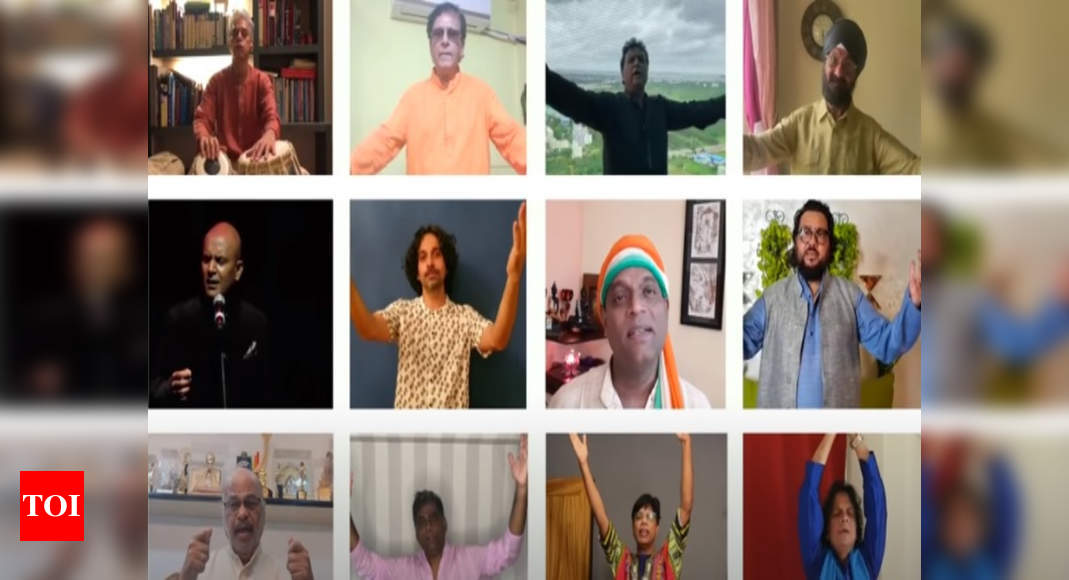


Prime Minister Narendra Modi was greeted with a grand welcome as he arrived at the hotel in Vienna, Austria. Austrian artists put on a stunning performance of 'Vande Mataram' to welcome PM Modi, who shared the video on social media. The conductor of the performance, Indian composer Vijay Upadhyaya, also received high praise from Grammy Award winner Ricky Kej. The Austrian artists who performed the rendition called it a "phenomenal experience" and a "big honour," with one artist describing it as a "huge opportunity" for Austria and their orchestra.
Prime Minister Modi's Grand Welcome in Austria: A Symbol of Strengthened Ties
Prime Minister Narendra Modi's recent visit to Austria was marked by a grand welcome and a heartwarming rendition of India's national song "Vande Mataram" by Austrian artists. Here's a deeper look into the significance of this event and related FAQs.
Background and Significance
India and Austria have enjoyed a long-standing diplomatic relationship that dates back to the 18th century. In recent years, the two countries have strengthened their ties across various sectors, including trade, investment, education, and cultural exchange.
PM Modi's visit was aimed at further enhancing these multifaceted relations. The Austrian government accorded him a warm welcome, highlighting the importance they attach to India as a strategic partner.
The "Vande Mataram" Performance
The highlight of the welcome ceremony was a stunning performance of "Vande Mataram" by Austrian artists. The rendition was exceptionally well-received by both the Indian delegation and the Austrian audience.
Indian composer Vijay Upadhyaya, who conducted the performance, drew praise from Grammy Award-winning composer Ricky Kej. Kej described the performance as "a beautiful gesture of friendship and respect."
The Austrian artists who participated in the performance expressed their gratitude and honored to have had the opportunity to showcase their talent and pay tribute to India's national anthem.
Top 5 FAQs
1. Why was PM Modi visiting Austria?
A: To strengthen diplomatic ties and explore areas of mutual cooperation.
2. What was the significance of the "Vande Mataram" performance?
A: It was a gesture of respect and friendship from Austria to India.
3. Who conducted the "Vande Mataram" performance?
A: Indian composer Vijay Upadhyaya.
4. What did Grammy Award winner Ricky Kej say about the performance?
A: He praised it as "a beautiful gesture of friendship and respect."
5. How did the Austrian artists view the experience?
A: They expressed gratitude and honored to have had the opportunity to pay tribute to India's national anthem.
Conclusion
Prime Minister Modi's grand welcome in Austria and the heartwarming rendition of "Vande Mataram" serve as a testament to the growing bonhomie between the two nations. It underscores their shared commitment to strengthen their partnership and promote mutual respect and understanding.

In 2016, Indian Army commandos carried out surgical strikes on terror launch pads in Pakistan-occupied Kashmir, marking a significant shift in India's counter-terror approach. This new policy, which adopted a more offensive and deterrent-oriented stance, was a direct response to the Uri attack and shattered the status quo that India had followed for years. The strikes not only punished those responsible but also served as a warning that terrorism emanating from across the border would not go unanswered, setting a new benchmark for India's future security strategy. This transformation has been further cemented by subsequent actions such as the Balakot airstrikes and Operation Sindoor.

India has expressed concerns over the recently signed mutual defence pact between Saudi Arabia and Pakistan, stating that it will study the implications on national security and regional stability. The pact, which aims to develop defense cooperation and strengthen joint deterrence against aggression, is seen as a response to recent geopolitical developments in the region. India, which has a strong relationship with Saudi Arabia, is reading the development cautiously, given the close strategic partnership between Saudi Arabia and India's rival, Pakistan.

In a significant move amidst ongoing geopolitical tensions, Saudi Arabia and Pakistan have signed a "Strategic Mutual Defence Agreement" to elevate their long-standing security partnership. The agreement includes a clause stating that any aggression against one country will be seen as an attack on the other, aiming to strengthen joint deterrence and further develop defense cooperation. With concerns about regional security on the rise, this agreement allows Saudi Arabia to formalize a partnership with a nuclear-armed state and provides Pakistan with renewed financial and diplomatic backing from a key regional power.

On his 75th birthday, the world's tallest building, Dubai's Burj Khalifa, was illuminated with images of Indian Prime Minister Narendra Modi and the words "Happy Birthday" in celebration. The Indian flag's colours - saffron, white, and green - were also displayed on the iconic building to mark the special occasion. UAE President Sheikh Mohamed bin Zayed Al Nahyan also extended birthday wishes to Modi on social media earlier in the day.

Indonesian President Prabowo Subianto was a special guest at India's 76th Republic-Day celebrations at Kartavya Path. This marked the second time an Indonesian President graced this event, with the first being 75 years ago. Accompanied by a delegation of six cabinet ministers and senior officials, Subianto witnessed a grand military parade and cultural performances, as well as brought a 352-member marching and band contingent from Indonesia.

Iran's foreign minister has announced that a prisoner swap deal with France is close to being finalized. The agreement would secure the release of Iranian nationals imprisoned in France and allow for the return of French citizens detained in Iran. This development comes as Germany announces its support for a French-led effort to establish a two-state solution in the Middle East.

Qatar's prime minister has accused Israeli Prime Minister Benjamin Netanyahu of destroying months of mediation efforts to secure a ceasefire deal and free remaining hostages in Gaza. With the lives of 20 hostages at risk, Qatar had been working with the US and Egypt to broker a deal, but Tuesday's attack on Hamas' leadership in Doha has killed any hope for a resolution. Despite Trump's promises that such an attack will not be repeated, Netanyahu continues to threaten Qatar, accusing them of harboring terrorists and vowing to take action if they don't comply.

In a shocking development, Israel has launched an attack on Hamas leaders in the Qatari capital, Doha, resulting in the deaths of six people. The Qatari government has condemned the attack as "state terrorism" and has raised questions about Israel's true intentions in the region. The attack ruptures the delicate ceasefire negotiations in Gaza, where Qatar has been acting as a mediator. This latest incident highlights the increasing involvement of Qatar in the volatile conflicts in the Middle East.

Israel's strikes on Yemen's capital come amidst warnings from their defence minister and public disapproval from Donald Trump following their attack on Doha. As the Middle East watches the tense situation unfold, Qatar struggles to recover from the unprecedented assault on their sovereign territory. A senior Qatari government member expresses anger and concern over the US's delayed warning of the attack, further complicating the already tense relations in the region.

Amid ongoing protests and the resignation of Prime Minister KP Sharma Oli, Nepal has appointed former Chief Justice Sushila Karki as the country's interim head. The death toll in the protests has risen to 25, with hundreds more injured. As the Nepali Army takes over security responsibilities, flights have resumed at the international airport and authorities are cautioning against the spread of misinformation on social media.